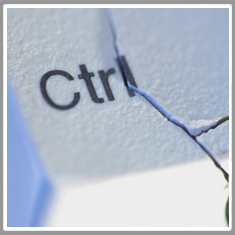 If you’re like most people, you probably have years’ worth of office work, research, addresses and phone numbers, school work, and thousands of irreplaceable family photos on your computer. Not to mention important financial information and the expensive software that runs the entire system!
If you’re like most people, you probably have years’ worth of office work, research, addresses and phone numbers, school work, and thousands of irreplaceable family photos on your computer. Not to mention important financial information and the expensive software that runs the entire system!
But what happens when your computer stops working? Do you have a plan to recover the data you need to run your life? Better yet, do you have an up-to-date backup waiting in the wings for just such an emergency? Here are some steps that can help you quickly and conveniently protect your information before it’s too late.
- Make sure you can easily reinstall your operating system and any software that you’ve purchased if your computer ever does crash. Keep the disks that come with your computer in a safe, memorable place so you can access them whenever you might need them.
- Use a USB flash (or thumb) drive to back up small or critical files you use often.
- Back up your important data regularly with your computer’s CD/DVD burner. Most DVDs can hold 4.7 GB worth of data. To back up larger files and even more data, you can double the capacity with double-layer DVDs (known as DVD DL) that can hold up to 8.5 GB!
- To safeguard every last byte of data, you can use an external hard drive that can be connected to your computer, but that ultimately operates independently. External hard drives are much larger – often as large if not larger than the amount of memory on your computer’s built-in hard drive. Plus, because they’re external, your data will still be safe and easy to access even if your computer crashes. Simply connect the external drive to a new computer and you’re up and running without a hitch. You can purchase a basic external hard drive with 300 to 500 GB of storage for as little as $100.
The bottom line is: The best way to recover data is to back it up regularly so you don’t lose it in the first place! Spending just a little bit of extra time doing so can save you a lot of extra work in the event of a crash.








Leave a Reply